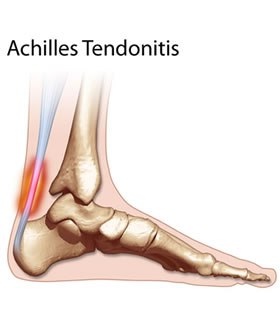Why is my Achilles tendon sore? Do I have Achilles Tendonitis?
Soreness or swelling of your Achilles tendon is caused by overuse or trauma. Constant stress placed on the Achilles tendon causes irritation, inflammation and pain.
There are several factors that can lead to inflammation of the Achilles tendon:
- Overtraining
- Tiredness or increased stress levels
- Poor running technique (biomechanics)
- Reduced lower limb and core muscle strength
- Poor balance (proprioception)
- Poor flexibility
- Inadequate footwear
- Running on hard surfaces
If you notice swelling in your Achilles tendon, the initial treatment is POLICE – Prevent further damage, Optimal Loading, Ice, Compression, Elevation.
Preventing Further Damage:
If your Achilles tendon is injured then the first thing to do is minimize any further damage. The easiest way to do this is to stop or minimize any activities that cause your Achilles to get sore. Your Chartered Physiotherapist is fully qualified to determine the extent of the damage in your Achilles tendon and advise you on the appropriate management strategy to adopt.
An Achilles tendon injury can vary from complete rupture to low grade inflammation. If you continue to run on an inflamed and injured Achilles tendon, you may put yourself at greater risk of an Achilles rupture. A complete rupture will require either surgery and a period of immobilization in a cast or a combination of both.
Optimal Loading:
Seek advice from your physiotherapist on what optimal loading for your Achilles is. This may vary from complete rest on crutches to continuing with modified training such as cycling, swimming, stretching and strength work.
Ice, Compression, Elevation:
Inflammation can be reduced by icing, compressing and elevating your injured Achilles. Apply ice for 20 minutes every 2-3 hours during the initial phase. Ensure you use a towel or a damp cloth placed in between the icepack and your skin to prevent ice-burns.
Your Chartered Physiotherapist can also use a combination of massage, taping, dry needling and exercise to decrease inflammation and improve recovery time from injury.
Rehabilitation Back to Full Training:
Achilles tendon injuries are notoriously slow to heal and have a very high recurrence rate. Once your inflammation has subsided and there is no pain on walking, your physiotherapist will commence you on a rehabilitation programme to get you back to full training and sport. Rehabilitation programmes consist of exercises to improve your leg and spinal muscle flexibility and strength. These exercises will also help improve your running technique (biomechanics) and balance (proprioception) and are essential in decreasing the chances of the injury recurring.
Your physiotherapist can assess your foot biomechanics and may also suggest changes in your footwear or temporary or permanent orthotics to decrease the workload on the Achilles tendon.
If you are looking for a Physio to treat your Achilles tendon in Dublin, you can book an appointment in to see one of our experienced Physio’s to get a more individualised assessment and treatment approach.

